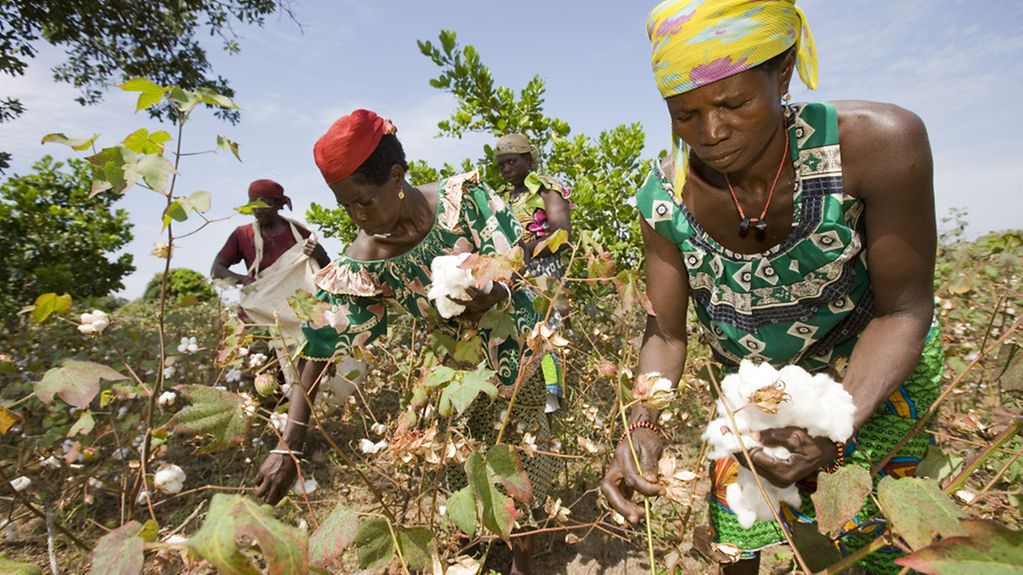Der Link wurde in Ihrer Zwischenablage gespeichert
The German government is engaged in many different ways in Africa, where it enjoys close cooperation with equal partners in the interests of sound political and economic development. Many of the worldwide challenges Europe faces can only be resolved by working with its neighbouring continent.
3 Min. Lesedauer

Cotton harvest in Africa
Foto: Aid by Trade Foundation
Africa’s potential is enormous. About half of the world’s 20 fastest growing economies are in Africa. By 2035 Africa will have the largest potential workforce in the world.
Last year, the Compact with Africa was launched – under Germany’s G20 Presidency. The initiative is designed to improve the conditions for private investment so as to get infrastructure projects off the ground and create jobs. Eleven countries have so far signed up for individual compacts, including Senegal and Ghana, which Chancellor Angela Merkel is currently visiting.
Key players include the African states, as well as the World Bank, the International Monetary Fund and the African Development Bank. They will negotiate individual reform programmes along with possible additional inputs to be provided by G20 partners, and implement these programmes.
The individual compacts with Africa represent a voluntary political commitment. They do not involve any financial support. That is why the German government has come to agreements on what it terms "partnerships for reform" in addition. These partnerships are already in place with Tunisia, Côte d’Ivoire and Ghana. Last year a total of 300 million euros were invested.
The three partnerships for reform aim to expand the use of renewable energy, improve energy efficiency and develop the financial and banking sectors. This is designed to improve conditions for national and international investors and make it easier for small and medium businesses to access loans. At the same time, more jobs and trainee places will be created for young people in forward-looking technologies.
Another part of the German government’s Africa strategy is to improve conditions for investment by extending Hermes export credit guarantees. Since June 2018, the level of risk not covered by Hermes guarantees, i.e. borne by the investor, for investments in the public sector has been reduced from 10% to 5% in Ghana. This will open up new sales and investment opportunities for German industry.
German development cooperation with Nigeria focuses on sustainable economic development. Germany is, for instance, supporting the reform of Nigeria’s financial sector and fostering the development of financial services for small and medium enterprises (SME). Germany is also active in the renewable energy and energy efficiency sector and in the health sector, where it is tackling polio.
Numerous African states receive support from Germany, for instance in the fields of good governance, agriculture and health, as well as in the education and training sector. The project "Successful in Senegal" is developing genuine prospects of a better future in Senegal for youth, young adults aged between 15 and 35, and returning migrants.
"The Partnership with Africa is about economic development, but also about promoting peace, stability and security. Development is only possible if security is guaranteed," said Chancellor Angela Merkel at the G20 Africa Partnership Conference held in Berlin in 2017. In view of worsening conflicts and the spread of terrorist networks, conflict early warning systems, mediation, peacekeeping and measures to support the fight against terrorism are to enhance security and stability on the African continent. In this context, the German government also supports the Sahel G5 states in the field of infrastructure measures.
Within the framework of the European Union, Germany has entered into migration partnerships with individual African states with a view to promoting training, employment and economic development, specifically for young people, thus addressing the root causes of migration.
Germany’s Africa policy aims to foster economic growth in Africa through a wide spectrum of development- and security-policy measures, as well as enhancing security on the ground and stepping up cooperation. This is intended to give the people of Africa long-term prospects.